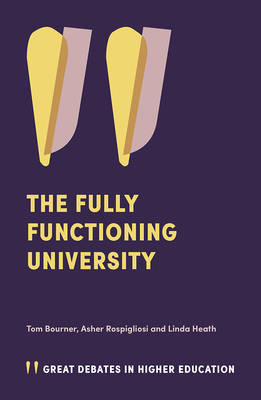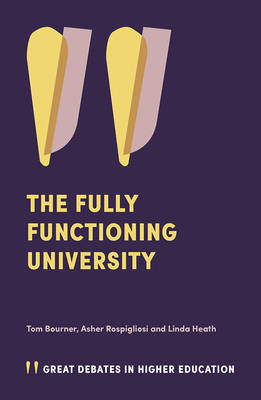
Bedankt voor het vertrouwen het afgelopen jaar! Om jou te bedanken bieden we GRATIS verzending (in België) aan op alles gedurende de hele maand januari.
- Afhalen na 1 uur in een winkel met voorraad
- In januari gratis thuislevering in België
- Ruim aanbod met 7 miljoen producten
Bedankt voor het vertrouwen het afgelopen jaar! Om jou te bedanken bieden we GRATIS verzending (in België) aan op alles gedurende de hele maand januari.
- Afhalen na 1 uur in een winkel met voorraad
- In januari gratis thuislevering in België
- Ruim aanbod met 7 miljoen producten
Zoeken
Omschrijving
Increasingly, the purpose and function of Western universities is being challenged and put under pressure to demonstrate value for students, policy, and society at large. Concurrently, the management and leadership of universities differs by institution and often prioritises one need other others. The three main goals that have persisted across the development of Higher Education in the Western world are; the higher education of students, the advancement of knowledge and service to those outside the university. In the history of the Western university one of these goals has always dominated.
A university cannot function fully if it must interpret two of its goals in ways that serve a third. The Fully Functioning University introduces the concept of a 'post-Humboldtian university' which values each of these goals in its own right, and the 'fully functioning university' as one which expresses the three goals entirely.
The authors outline the sort of higher education that a fully-functioning university would offer, the implications of the concept of a 'fully-functioning university' for its contribution to the advancement of knowledge, and the contribution of the fully-functioning university to the service part of the tripartite mission. This timely book will be relevant for senior managers and leaders in higher education in the UK and internationally, as well as for higher education researchers and postgratudate students.
A university cannot function fully if it must interpret two of its goals in ways that serve a third. The Fully Functioning University introduces the concept of a 'post-Humboldtian university' which values each of these goals in its own right, and the 'fully functioning university' as one which expresses the three goals entirely.
The authors outline the sort of higher education that a fully-functioning university would offer, the implications of the concept of a 'fully-functioning university' for its contribution to the advancement of knowledge, and the contribution of the fully-functioning university to the service part of the tripartite mission. This timely book will be relevant for senior managers and leaders in higher education in the UK and internationally, as well as for higher education researchers and postgratudate students.
Specificaties
Betrokkenen
- Auteur(s):
- Uitgeverij:
Inhoud
- Aantal bladzijden:
- 168
- Taal:
- Engels
- Reeks:
Eigenschappen
- Productcode (EAN):
- 9781839825019
- Verschijningsdatum:
- 18/03/2020
- Uitvoering:
- Paperback
- Formaat:
- Trade paperback (VS)
- Afmetingen:
- 124 mm x 193 mm
- Gewicht:
- 181 g

Alleen bij Standaard Boekhandel
+ 178 punten op je klantenkaart van Standaard Boekhandel
Beoordelingen
We publiceren alleen reviews die voldoen aan de voorwaarden voor reviews. Bekijk onze voorwaarden voor reviews.









